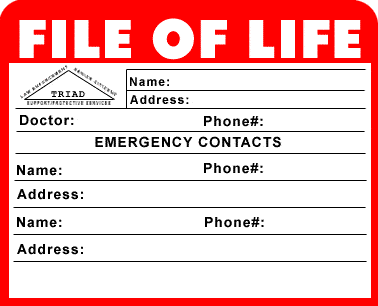Many of us have heard about the “ICE” program, which consists of saving a contact who is named “ICE” in your contact list on your phone. This contact is an individual that has potentially life saving, medical information about you and in case of an emergency, first responders would know to contact that individual listed as “ICE”.
This is a great plan and everyone should do it, however there are many situations and circumstances where this information would not be readily available to a first responder. If your phone is password protected emergency responders would not be able to access your contacts. Also, there may not be time for a first responder to try to locate your phone. What if your phone is different than ones that the first responders are used to? Valuable time could be lost looking for a phone or trying to access information off of an unfamiliar device.
That is why former police officer Laura Weller offered these life saving tips for those individuals with medical issues that first responders would need to know in case of an emergency.
“Here are my suggestions to gain the attention of Police, EMT and Firefighters in the event of an emergency.”
1.) Tape the emergency information to the back of your driver’s license (do not cover valuable information including bar codes)
2.) Check with your Secretary of State as some states now allow you to add information about your medical history to your driver’s license. This information would only be available to those permitted to run your driver’s license (dispatchers and law enforcement officials).
3.) Carry a “File of Life” next to your driver’s license. www.folife.org
4.) Attach medical information to your vehicle registration and insurance card.
5.) If you travel with small children attach emergency contact information, including the child’s full name and date of birth, to their car seat.
From my professional experience as a former police officer, who has respond to hundreds of vehicle crashes, police officers look for your driver’s license and/or State ID first, followed by vehicle information, NOT your phone. Also keep in mind, the laws in many states have changed and police officers [may] need to obtain a warrant to look in your phone. If that is the only place to obtain emergency information it may be awhile. “
Laura Waller, the Department of Organization, Inc.
Emergencies happen all of the time. It’s very easy for us to think “that will never happen to me”, but we cannot predict when a life or death situation may occur, so a few simple steps now could save a life later.
Happy Organizing! Bridges



